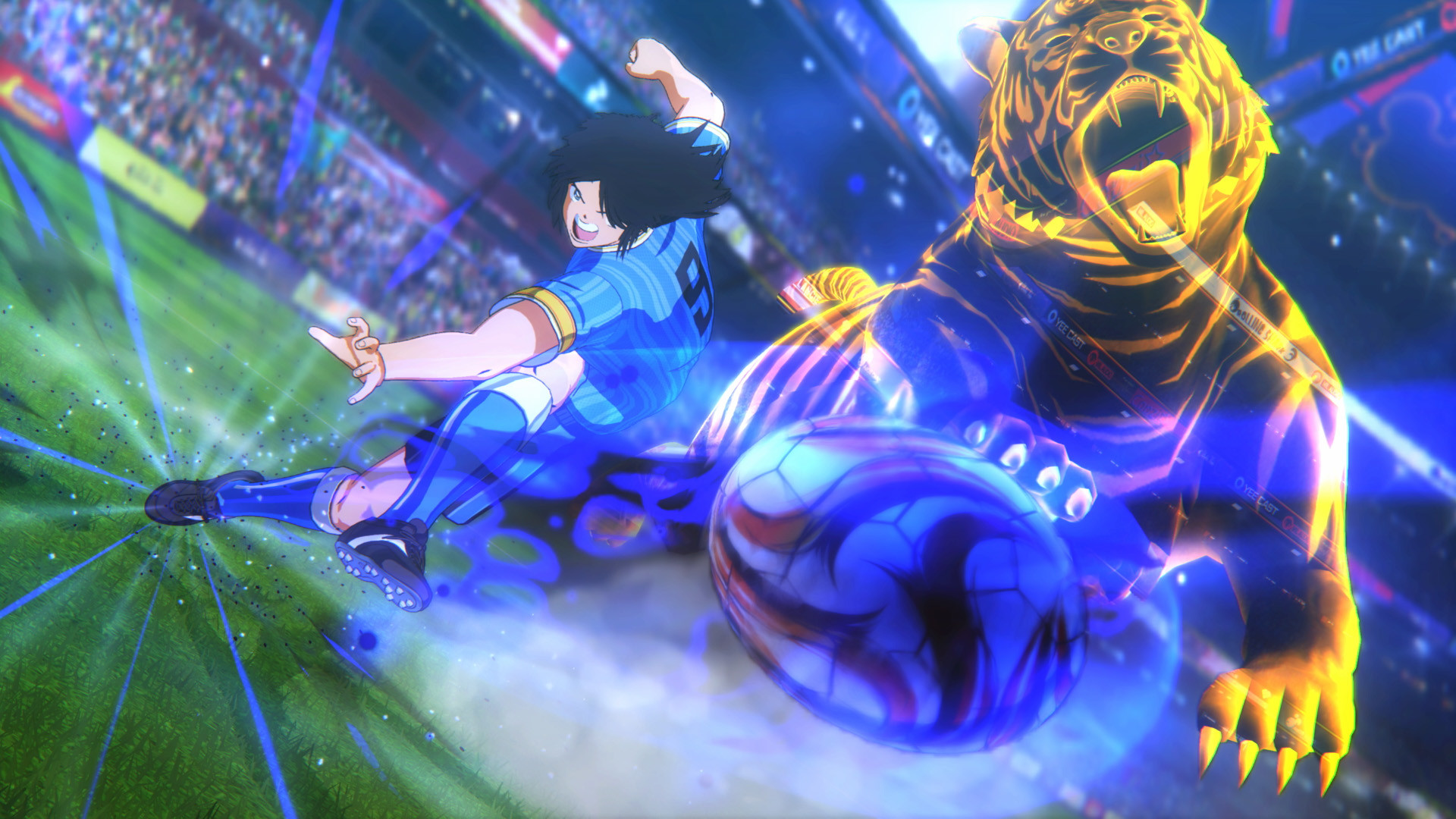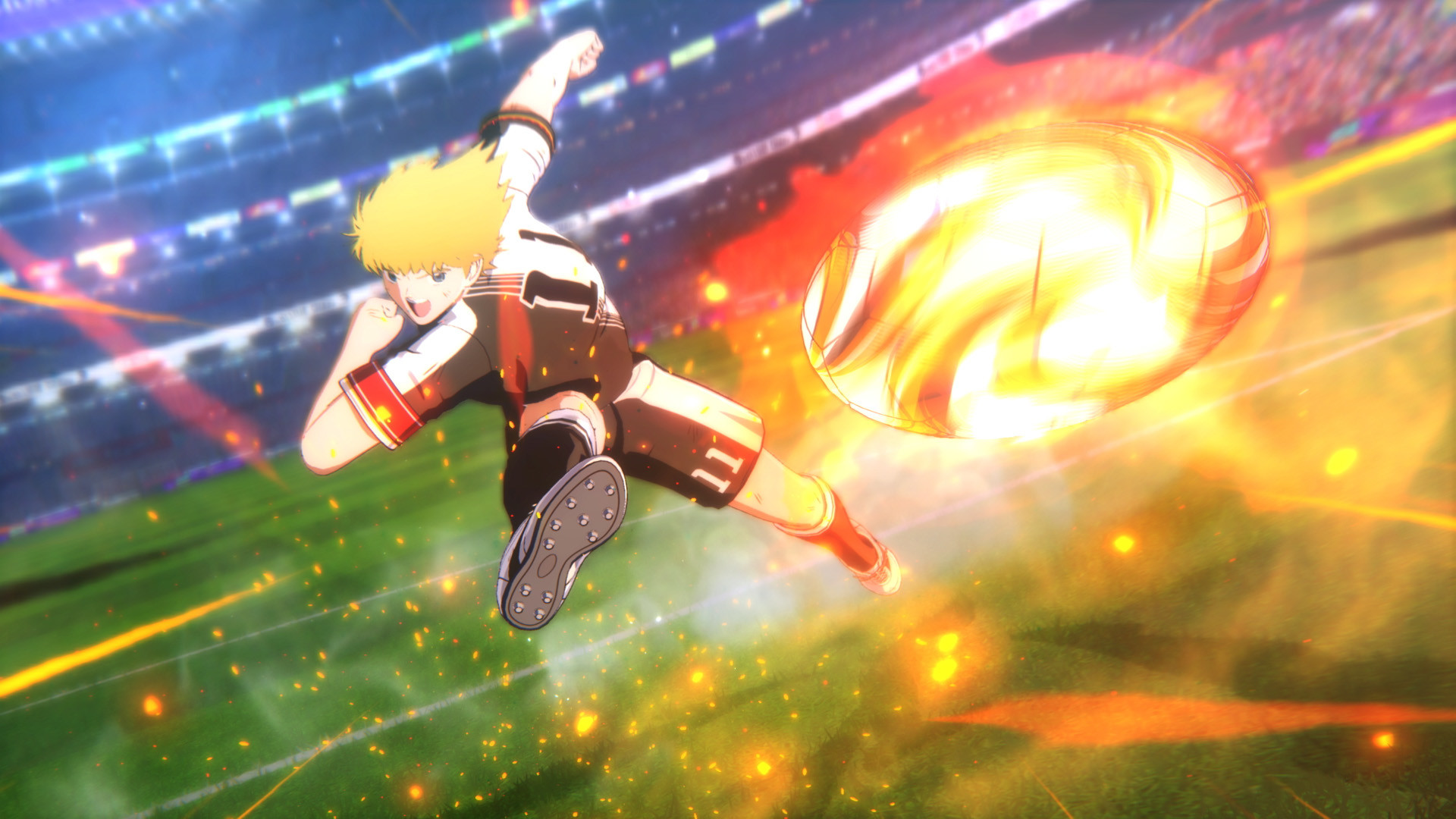After having spent years and years poring countless hours into FIFA and PES, my first couple of matches in Captain Tsubasa: Rise of New Champions were a strange experience. It was like learning a second language- there were so many things that I would instinctively try to do that just wouldn’t work, things that had been engraved into my brain. The thing is, Captain Tsubasa: Rise of New Champions is not going for the kind of experiences that the AAA hyper-realistic football sims offer- it’s going for something completely different, and once I came to terms with that, I was able to appreciate it much more.
Based on the popular and long-running Japanese manga of the same name, Captain Tsubasa: Rise of New Champions is an absolutely bonkers representation of the beautiful game that encourages you – hell, even nags at you – to stop worrying about fouls and penalties, about making mazy runs on the wings, about setting up the perfect cross, and tells you to just let loose in its world of arcade-y, over-the-top football. And when you’re on the pitch, the result is an enjoyable game based on a sport that has been pigeonholed into the simulation genre for well over a decade.
The focus here is on keeping the action fast-moving at all times, so the game encourages you to do things that you wouldn’t ordinarily want to do in a football game, like running to a striker at full speed and tackling him from behind with reckless abandon, or taking a shot on goal with maximum shot power from the halfway line. Just as an example, how you go about scoring a goal in Captain Tsubasa is quite different from how you’d ordinarily do it in most other football games. Goalkeepers have a spirit meter, and every time they save a shot, that meter drains, and how much of it is drained varies based on how powerful your shot was. The best way to score a goal, then, is to whittle their spirit meter down as much as possible to ensure that the next shot you take won’t be one they can save, which means you’re constantly taking shots throughout the course of the match. That doesn’t mean that’s the only way to score a goal, of course- particularly good shots can find the back of the net even against a goalkeeper with a healthy spirit meter. But that doesn’t happen too often.
"Captain Tsubasa: Rise of New Champions not only encourages you to keep doing these things, like far-flung shots on goal from impossible positions and crunching tackles that would get you sent off in a heartbeat in a real football game, it also rewards you for them."
Captain Tsubasa: Rise of New Champions not only encourages you to keep doing these things, like far-flung shots on goal from impossible positions and crunching tackles that would get you sent off in a heartbeat in a real football game, it also rewards you for them. Most tackles, for instance, result in you stealing the ball from the opposition, which means winning possession back and building up another attack is easy- but by that same token, that holds true for the opposing team as well.
The underlying mechanics in Captain Tsubasa are fairly simplistic. Stripped down to its bones, it might be a perceived as a game that’s lacking mechanical depth, but the real enjoyment comes from the gleefully silly way it presents them to the players. Special moves – such as crunching tackles, slipping past oncoming defenders with perfect timing, cracking shots from a distance, last-ditch blocks of devastating shots – trigger mini-cutscenes.
The camera immediately zooms in from your regular action to show off these brief moments, and then puts you right back into the game. What helps is that there’s a solid amount of variety with these special cutscenes, and which one gets triggered and when one gets triggered depends entirely on what’s going on on the pitch- which, of course, is entirely up to you as a player, like blocking a specific kind of shot with a specific defender, or letting a shot loose after successfully dribbling and dodging past two opposing players in quick succession.
"The underlying mechanics in Captain Tsubasa are fairly simplistic. Stripped down to its bones, it might be a perceived as a game that’s lacking mechanical depth, but the real enjoyment comes from the gleefully silly way it presents them to the players."
Of course, given Captain Tsubasa’s emphasis on flair and arcade-y fun over mechanical depth, there are some issues that are hard to ignore. Dribbling for instance, is far too simplistic and restrictive, and doesn’t allow you to build up attacks very well. Teammate AI is also not the best, and I can’t tell you how many times I was waiting for them to make the most painfully obvious runs into empty spaces, only to watch them just mill about restlessly in the same spot. Penalties are also a bit too simplified, to the extent that they more or less become a guessing game. All of these issues ensure that Captain Tsubasa is a game best enjoyed in short bursts rather than over prolonged sessions of gameplay.
Clearly, the game’s biggest strengths are on the pitch – as they should be – but the story modes don’t seem to understand that. There are two separate campaigns on offer. There’s Episode: Tsubasa – which sees you playing as the titular Tsubasa Oozora and his teammates as they try and win the Nationals for a third year in a row – and Episode: New Hero – which allows you to create your own custom character from scratch and craft your own custom story and journey, starting in one of three school teams and progressing all the way up to the international level.
Both of these campaigns – especially Episode: Tsubasa – seem oddly reluctant to let you do what you’re her to do- play football. In Episode: Tsubasa, between all matches, there are torturously prolonged periods of storytelling where characters ramble on and on about things that don’t matter. Fans of the manga will appreciate a lot of the interactions here, I’m sure, but storytelling here is done through static and awkward cutscenes, and the writing is predictably sloppy- seriously, characters go from being deplorable rivals on opposing teams who defile the spirit of the sport before kick off, to suddenly doing a complete 180, humbly accepting their losses, and cheering Tsubasa on as soon as their team loses. And it happens again and again.
"In Episode: Tsubasa, between all matches, there are torturously prolonged periods of storytelling where characters ramble on and on about things that don’t matter."
Episode: New Hero does stave off these issues to some degree, given the fact that a lot of the time between matches is spent on things that make an actual mechanical difference, such as choosing which characters to interact with and grow your friendships with in order to learn new skills- but there’s plenty of long stretches of clumsy and uninteresting storytelling here as well. Thankfully, you can skip most cutscenes and just keep mashing X to skip the absolute barrage of dialogue boxes to get back to the good stuff (relatively) quickly, while outside of the campaigns, you can always jump into a quick match, whether solo or multiplayer, if you just want a quick game of bizarro football.
Captain Tsubasa: Rise of New Champions is not a perfect game, and it’s not the most mechanically dense game, but thankfully, it doesn’t have to be. Its strengths lie in its unhinged, over-the-top on-pitch action and its delightfully silly presentation. If you’re looking for a football game that lets you focus on all the fun aspects of the sport while ignoring almost everything to do with tactics and strategy, this is the game for you.
This game was reviewed on the PlayStation 4.
from Video Game News, Reviews, Walkthroughs And Guides | GamingBolt https://ift.tt/34M3ijl



Comments
Post a Comment